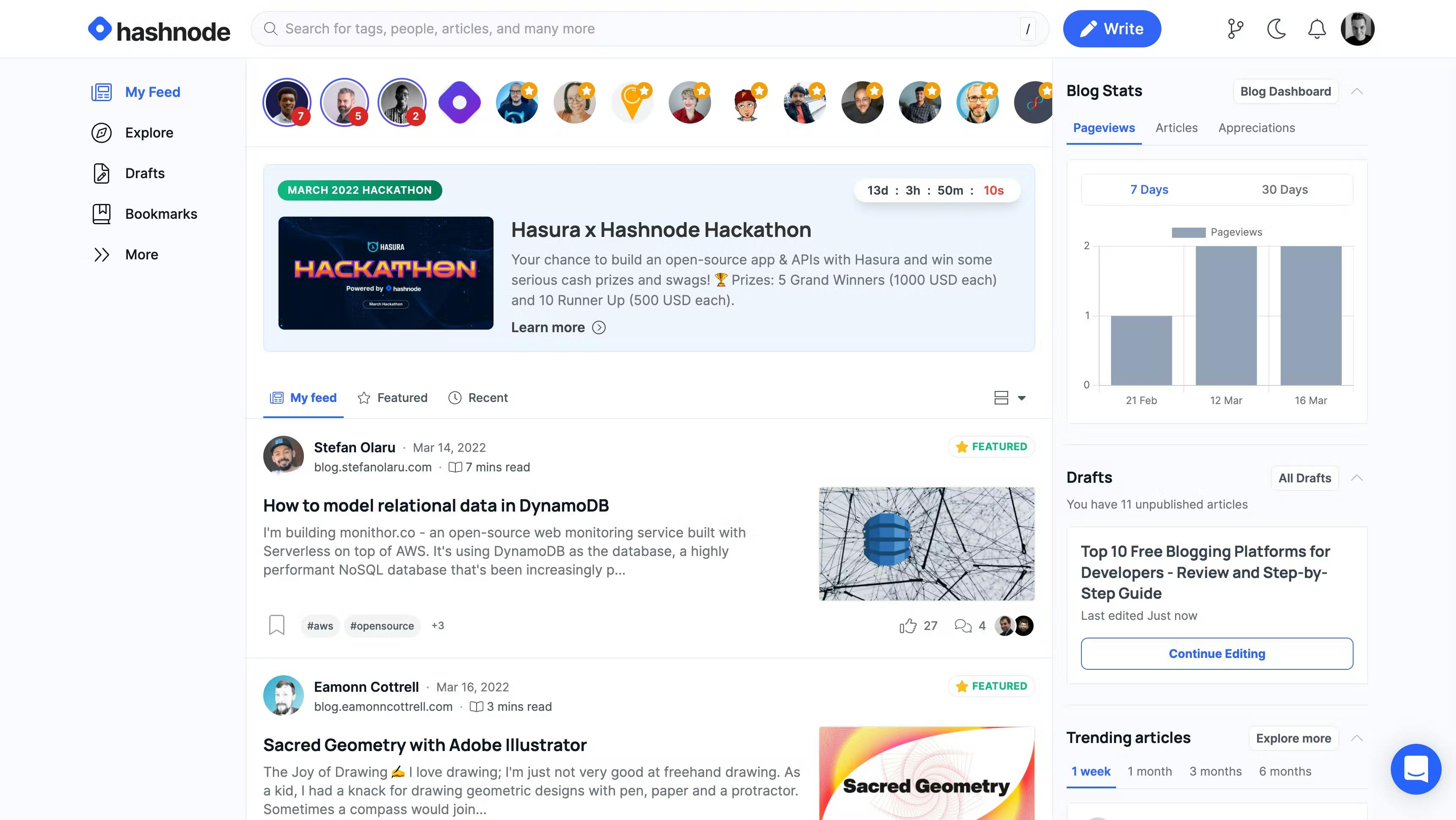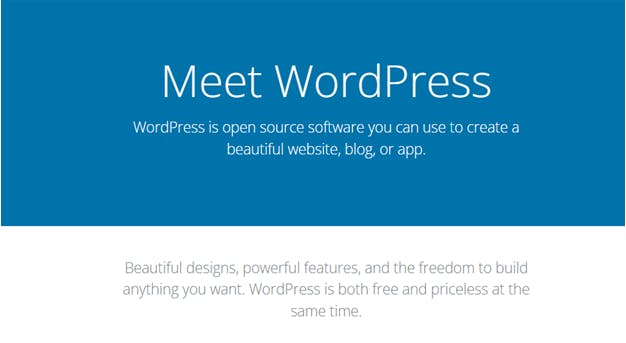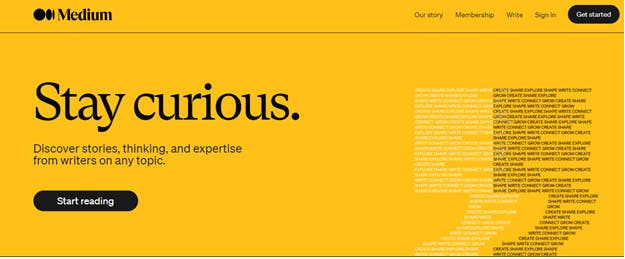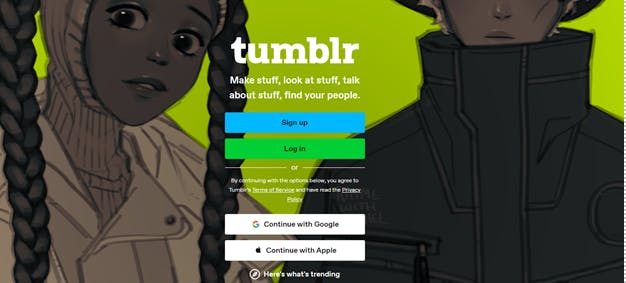Table of contents
- What is blogging?
- A short history of blogging
- Should you start your own blog?
- How to start a successful blog in four steps
- Best 5 blogging platforms
- Conclusion
- FAQ
The number of blogs you can find on the world wide web is 600 million.
The percentage of internet users that read blogs is 77%, and 46% of them take recommendations from bloggers into account.
That's the power of blogging.
Many people ask - is blogging dead in 2022?; but skeptics have been asking the same thing since 2012.
They keep repeating it every year, with the same cold, unshakeable answer—blogging is here to stay.
Once upon a time, people were creating personal blogs to keep themselves entertained and have a place to share their thoughts.
But now, blogging has become a full-time job for many people who are passionate about it.
They either ghostwrite for other people or are making money blogging on their website.
And let's not count the endless business blogs that have been created in the last years.
Businesses have understood that using blogging as a form of content marketing is a highly efficient way to bring more engagement to their site and, eventually, more customers.
Starting a blog is not just a hobby anymore—it's a way of living and doing business.
If you have decided to create your blog, you should first understand what blogging is and if you should start a blog in the first place.
We will teach you how to make a successful blog step by step.
We will also talk about the top five blogging software you should consider.
Reading our complete guide will help you become half an expert in blogging. You will become a true expert only if you execute our step-by-step guide and listen to our instructions.
What is blogging?
Blogging refers to written and visual content that is shared online and self-published. Blogs are also a form of social networking service.
In addition, bloggers don't just produce content but engage with others' new blog posts or reply to comments on their own blogs.
This way, they build social relations.
Many bloggers usually stick to a subject and write about a particular topic like travel, finance, marketing, politics, sports, science, etc.
Others that have a personal blog run them as an online diary.
Some other blogs function as news blogs, not giving any comment but simply stating facts.
Many of them are written by journalists. And there are also business blogs that enterprises own.
Blogs are primarily textual, but they can also combine images, videos, links, and other media attached to them. Some types of blogs are photoblogs that focus mainly on photographs, vlogs that focus primarily on videos, MP3 blogs focused on music, and audio blogs or else called podcasts. Blogging can also take other forms, like microblogging which focuses on short posts or instructional resources known as edublogs.
A short history of blogging
In the early 1990s, people would run online journals, keeping track of personal events in their lives. They called themselves diarists or journalers. This term was used for a few years. Then, the word blog and blogger came on the scene.
Theterm blog originates from the word weblog, which Jorn Barger created in December 1997. The shortened term was then made by Peter Merholz, who was joking around with the word in his site—Peterme.com in 1999, breaking it into 'we blog.'
Blogging became popular during the late 1990s after creating content online became accessible to everyone. You had to know technologies like HTML to create a blog post before. Tools became more sophisticated, so you didn't need to be a technician to become a blogger.
A new blog was created every second of the day during 2008. Some called it the new mania. Blogging platforms took an even wilder ride after 2010 as more and more people had access to the internet. In February of 2011, there were over 150 million blogs in existence.
Should you start your own blog?
There are many reasons people start their journey as a blogger. Some want to make money blogging, some simply want to spend their free time writing about a topic they like, some want to start a business, and others want to build an audience.
It doesn't matter why you want to start a blog—we recommend you go for it.
Pros of blogging
Creating a new blog brings excellent advantages. Let's discuss them below.
Become self-employed
Everyone would love waking up at whatever time they want, working whenever or wherever they want, being their own boss, and not having to participate in cheap gossip in the office.
That doesn't have to remain a dream. Starting a blog can help you achieve all the above. You will not only start making money, but you will also have the freedom you always wanted.
Creating a profitable blog is not as easy as it sounds on paper, but there are a ton of people out there that have made it, and they're no better than you. You can sell advertising space, earn through affiliate marketing or sell your info products.
Different sites state different numbers, but one pattern gets repeated—the number of people making money from blogging is not large, but those who do, are getting big paychecks. Some state that bloggers earn $37,073 annually on average and can even go up to $100,000, but this only applies to bloggers with years of experience.
If you play your cards right, you can start making money blogging in the first year. But even if you earn just a few dollars a month, it is nice having extra cash to pay for your coffee, isn't it?
Build relationships
Humans crave connections. It's in our DNA. That's why many people find it amazing that you can connect with so many other bloggers through a blogging platform. Almost all sites allow comments to leave your opinion and insights below someone's blog post. That way, you can build a relationship with your colleagues and fans. Furthermore, blogs fail if they don't create a loyal fanbase.
Starting a blog is perfect for introverts that prefer solitude over noisy social gatherings but still want to make friends and have a conversation with them. Interacting with other bloggers helps extroverts, too, as blogging is a working-from-home type of job and can get quite lonely.
You get to meet people who share your same hobbies and interests. It will help you feel heard and part of a community full of like-minded people. You can also strengthen relationships with other professionals in your industry if your blog has a specific niche.
Even if you have a business site and need to make specific blog posts with a formal tone, connecting with your prospects can help you build a strong rapport with them. Customers are way more likely to make a purchase from a business that has maintained communication with them. Connecting with prospects via a blog post makes them trust you more than a company they have no interaction with.
Gain exposure
Relationships are not the only thing you can build if you begin blogging. Gaining exposure and building authority is another great advantage of using a blogging software platform. Even if you don't have a profitable blog that generates income, you can exploit it in other ways. If you create blog posts with valuable information, you can get noticed as an expert in your niche. A personal blog is often used as a place to showcase professional skills.
For example, there are lots of content writers that have a blog dedicated to freelancing or copywriting. Their posts can rank high on search engines if they implement off and on-page SEO, and they will have it easier to be found by possible clients. Their blog is proof that they can create content that can rank high so clients will trust them. As you can see, if you make a well-known blog online, you may start receiving lots of job offers in your field.
But this advantage doesn't apply only to writing jobs. Let's say that you are a developer and think that your profession and blogging do not correlate. What you don't know is that having a dev blog will help you get noticed by employees looking out for a programmer. It will give you a hand to land more jobs and catapult your reputation as a developer. The same thing can be said for every profession or field.
Look at your blog as a personal portfolio that you can show to your clients. It's your way of convincing them that you are worthy of doing the job. When you start blogging, you also start a personal brand that will differentiate you from other competitors. Your blog builds your name, so investing in it will always have a huge return.
Businesses can also gain a lot from online exposure. You can build a strong business image by starting a blog and showing your company's authenticity online. Valuable blog content that answers clients' questions helps companies build trust and demonstrate commitment to helping them. It will make your business the first choice on the client's list when it's time to make a purchase.
Improve yourself
Starting a blog and building an audience takes a lot of consistency. You have to show up every day, and if you can't achieve that, at least every week. You will have to do lots of research on different topics, a lot of brainstorming, and a lot of writing. If you have ever asked yourself, 'What do all great writers have in common?' here is the answer—they all write every single day.
How could it be any different anyway? Athletes train daily to achieve greatness and be in their best physical form. The same goes for writers. Starting a blog will help you improve your writing skills day by day.
If you start a blog, you will improve your writing skills and gain technical skills about your writing topic. For example, if you are a marketer, you will have to do lots of research in your field to write a new blog post. That will help you learn while having fun. All the research you should do will help you keep up with the latest trends, and writing about new tools and concepts will help you memorize them easier.
Starting a blog can also help you learn new things like search engine optimization, social media marketing, etc. It even teaches you how to become a more organized thinker as you will have to rephrase your sentences a lot of times. Another benefit of creating content that may not be too visible at first is that it helps you build healthier habits. It teaches you perseverance, consistency, and hard work.
Cons of blogging
You may have gotten inspired to start a blog now, but you must also know that blogging has a few downsides. Let's explore them below.
Time-consuming
No matter what they tell you, it's impossible to write an excellent post that will attract readers in just a few minutes. When we say blogging is easy, we mean the setup process of starting a blog. But the drafting, writing, and editing take time. You will need to pick a topic to write about, create an outline, do some research and rethink your article many times while writing it.
There was a time when the ideal blog post for search engines was pretty short, but those days will not come back soon. If you wish to have a popular blog today, the
length of your posts should be around 2000 words. Such posts rank higher on Google and have more views. And let's not talk about the time you will have to spend promoting your blog or connecting with other bloggers.
Writing is not for everyone
Everyone knows how to write, right? Well, no, you are wrong. Everyone can put syllables and vowels together to form a word, but not everyone can create meaningful blog content that readers will love. Especially if you are a part of a more practical field, writing may not be your strongest point.
Maybe you are not used to writing in a chatty tone as your day-to-day job is filled with technical language. Your first blog post may even be terrible, but you shouldn't get discouraged by this fact. Just do your best to improve, but be ready for a journey full of doubts. As we said before, writing frequently will strengthen your skills exceptionally.
The truth is that blogging may even lead to burnout. If you have a full-time job, you may have to alternate them both, which can make you overtired. Sometimes you will have to face writers' block and feel uninspired to create a new post. Many things in life aren't easy and having your own blog is one of them.
How to start a successful blog in four steps
Now that you know what awaits you if you start a blog, you may understand that blogging should be taken seriously if you want to have success. You should learn all the secrets of starting a blog in advance so you can seem like a pro even with your first blog post. We have created a four-step guide on starting a blog below if you are serious about this new journey.
Pick a niche, name and the platform you will use
We will talk about what blogging platform you should pick later in this article. Right now, focus on choosing a blog name and topic.
Choose your blog's niche
There are a sea of niches you can pick from, with some being more profitable than the others. But don't focus too much on the potential earnings of a blog theme. Just choose something you like to write about, and success will follow you. Sticking to a niche is a crucial step because your blog can't be all over the place with plenty of topics going on. This will confuse the reader, making it hard to build a loyal following.
Choose your own domain
The next step is picking out a suitable name for your new blog. Most of the time, bloggers also use their blog name as their custom domain. That means that the blog's name will also be your URL or internet address. Your website name is crucial because it's the first thing people will notice about you, along with your profile pic.
You can start a blog with your personal name and put it as your custom domain name. If you want to remain anonymous or just don't prefer using your name, you can pick something that fits your blog theme.
A blog name should describe to your visitors what your site is about so they will get a clear picture of your content. Think about what kind of stories you will post and try to pick a name that will relate to them. Maybe you can also include your target audience or writing style in your name.
Customize and optimize your blog
There are some technical sides to blogging too. What did you think? Is it all just writing and publishing? Well, not really. If you want to start a blog that readers enjoy and search engines love, you should focus on customization and optimization.
Pick a theme
Lucky for you, you can customize your website without needing technical or design skills. They are easy to implement and make your blog way more fun. Themes make your site more pleasant to look at and may even describe your blog.
You need to pay to access some themes, but others are free to use. You can search them by category and pick one that fits your blog. The same goes for every platform.
If you have a business blog, just focus on choosing a simple, responsive theme to avoid messing with clients' heads. Themes with fonts that are difficult to read won't do it. Pick a simple theme but not a blunt, boring one.
Make your blog SEO friendly
SEO is not meant to be implemented only on posts. You can also optimize your main pages to be found easier on search engines. You can start by choosing a name that describes what your site is about. Google bots look at your domain to determine what your website is about.
Then create pages like homepage, about us, contact page, service pages if you have a business, etc. Explain what you do on the home page and incorporate keywords there if you can. All web page copies should be created with SEO in mind.
Focus on improving Page Load Time and creating an efficient site structure. Make your website easy to navigate so clients/readers can find what they are looking for with just a few clicks. Also, make your main pages as visual as possible, so it is compelling for visitors. People respond better to websites with images or videos.
Create content
Now you are ready to create your first blog post, earn a huge following, become a superstar blogger and buy a house in Bali. Ok, ok, not so fast champion. Content creation is the fun part of blogging but also the hardest part. Read below to learn what you can do to write captivating content.
Brainstorm blog topics
Some people finish all the above steps and ask, 'What now? What do I write about?' That's why it's essential to start a blog on a niche you love. You won't have too many sleepless nights trying to think about any blog post ideas.
If you are passionate about your site's niche, finding topics to write about comes naturally. Just sit in a silent place away from your phone or other interruptions. Write a list of questions about your niche during this distraction-free time. Use these questions to create posts that will help your audience.
Use a keyword research tool to find the most relevant ones. Start with a keyword topic and then break it into smaller sections. You can even try idea generator tools or do some competitor analysis. Also, don't forget to try Google suggestions or dive into social media to observe the most talked-about topics. Use a Google Analytics account to identify the latest trends.
But the most crucial thing of them all is to do lots of research. This is crucial for finding great topics and drafting and writing a new post. Reading content and analyzing it is the best way to brainstorm blogging ideas.
Shift your perspective
Ask yourself these questions 'Do I enjoy learning about this topic?'; and 'Are others interested in the same thing?' Whatever you are writing about, make sure that it's exciting and enjoyable, or forget your dreams about building a loyal audience. Oh, and your house in Bali too.
Try your reader's shoes, be them heels or sneakers. Visualize them—what do they like, the problems that concern them, the things they are curious to learn about. Put yourself in their place and imagine reading your posts for the first time. Do you think they will pay attention to what you have written? Would you enjoy how the post is written? Would you care about this subject matter?
Show your writing to someone else and ask them for advice. Ask them if the blog post is clear if they find it engaging or not if they would like to read more from you as a writer or not.
SEO does the magic
Don't forget to implement SEO tactics on your entire blog. Optimize the title of the post, the images you are using, the header tags, and the post's meta description. Focus on link-building, use keywords, etc. Don't expect to start a blog that will become lucrative without investing in SEO first.
Promote your blog online
Do you want likes, shares, views, reads, success? Well, SEO works day and night, night and day, but you should do some of the work too.
Use social media
Create accounts on social media platforms where your audience hangs the most. Promote your content in online communities on Facebook, Pinterest, Instagram, YouTube, LinkedIn, Twitter, or Reddit. You can choose more than one platform but don't overdo it. You can't manage all these social sites yourself, and not all of them can help you connect with readers.
If your blog is lifestyle-oriented, then Instagram or Pinterest would be the perfect places for you to promote your blog. Do you want to start a blog about IT and developing themes? Reddit may be the ideal place for you. Do you wish to start blogging about NFTs? Then make Twitter your best friend.
Adding social media elements to your site will help your readers engage with your blog. If they like your posts, they want to share and talk about them. This will also help you boost your views. Moreover, don't forget to share your posts on forums and groups.
Comment on other blogs
Search for other blogs of your niche and interact with them. Just like following for following, bloggers tend to give back comments as a favor after you have commented on their post. Many platforms favor comments as this means that the post is interesting and catches people's attention. If you gain many comments, the platform will show your blog post to other members.
Alert your inner circle
Now it's your chance to scream, 'Hello mom. Im famous.' Don't be afraid to ask for support from your close circles. Usually, the first customers of any business are the founder's family and friends. Encourage them to refer your blog to other people. If they are true friends, they would be more than pleased to do it.
Best 5 blogging platforms
So far, you have learned what blogging is in the first place, the advantages and disadvantages of it, and all the necessary steps to create a blog. Now it's time for you to choose a blogging platform and start blogging immediately. Read below our in-depth review of the best five blogging platforms. Learn all about their features, what users like and dislike the most about each one, their pros and cons, etc.
Our top five blogging platforms are:
- Hashnode
- WordPress
- Medium
- Blogger
- Tumblr
Hashnode

The fully-optimized blogging platform Hashnode is an excellent choice for everyone looking to start a blog for the first time. It has a simple, clean website that everyone can use no matter their computer proficiency and yet has pleasant and modern aesthetics. The website and mobile app are pretty responsive and have an excellent user interface.
It mainly focuses on the developer community, and most users there have programming backgrounds. Still, everyone is welcome to sign up for Hashnode. This blogging platform even has its own blog where you can find their latest updates and other developing-related news.
There are not too many free blogging sites out there, but Hashnode is one of them. How free is Hashnode? Totally free! You won't even have to suffer through frustrating ads and annoying pop-ups. More than anything, they value the relationship between a writer and its readers. That's why they don't put ads or even a paywall on your article.
You may be thinking that because Hashnode doesn't pressure readers to pay to read your articles, you can't make a profit from your blog. That is not true because you can still monetize your free blog.
Hashnode even gives you a free domain name and lets you own your content. It offers you all the needed tools for the optimization of your content and also distributes your articles to their online communities.
Hashnode's customer support is available 24 hours a day, 7 days a week. You can contact them through email or by sending a feature request. You can also ask the community on discord or check their FAQ pages, guides, and other helpful support docs!
Check out Hashnode now!
Hashnode key features
- Blog on personal domain
- Own your content
- No paywal
- No ads
- Share articles to a large audience of devs
- Free SSL certificate
- Content organization and drafts
- Custom design
- Export and download all your posts
- Data ownership
- Free built-in newsletter service
- Built-in analytics
- Edge caching with SSL
- Free blog
- One of the most active communities of developers (close to two million tech people on the platform)
- Blog on your personal domain and still reach the Hashnode community
- Monthly hackathons with cash prizes
- Article Series for content organization
- Hashnode powered blogs are blazing fast (almost perfect speed score)
What users like about Hashnode
Lazar Nikolov, Partner at CodeChem on Product Hunt says:
"Migrating from WordPress to Hashnode was my best decision. No other platform puts your articles in front of thousands of readers as Hashnode does. Feature-wise, you get Custom Pages, Custom CSS, Analytics, Web Monetization, and if you invite 3 friends, you also get Custom Widgets, so you can plug your MailChimp or any other integrations you have. And, crazy enough, all of that is free!!! Just bring your own domain!"
What users don't like about Hashnode
There have been no negative reviews of Hashnode on Product Hunt.
WordPress
This blogging platform is so famous that you can easily question if it's there anyone that doesn't have a WordPress blog. Because of its popularity, you can tell that WordPress is doing something right. Its fame comes from the fact that WordPress isn't only a blogging platform and a website builder.
There are two versions of this platform, Wordpress.com, and Wordpress.org. The main difference is that WordPress.org is the self-web hosting version. It gives you complete control of your website and lots of flexibility like open code access and an infinite number of plugins, which can be found in your WordPress dashboard.
This open-source content management system lets you have your own self hosted WordPress blog, although it doesn't offer a free domain. For blog hosting, you will need to use one of the web hosting companies available for WordPress. For example, you can create a Bluehost account. A web hosting plan will cost anywhere between 5$ to $100.
Anyone can access this platform as you don't need coding knowledge to create a new WordPress blog. Despite this, if you want to manage your self hosted WordPress blog, you will need some technical knowledge. You will also need coding skills or hire a developer if you face any troubleshoot issues as there isn't any customer support available for free. The technical support for a WordPress blog can cost up to $1000 a year.
Another aspect of this blogging platform that makes it great is the WordPress themes. Thousands of them can make your WordPress blog look just as you wish. There is a WordPress theme for any site you can think of: e-commerce, forum, business website, etc. You can choose a free WordPress theme or paid one.
WordPress key features
- Media syndication and sharing buttons
- Open code access
- In-build SEO tools
- Large professional community
- Infinite number of plugins
- Newsletter management
- WYSIWYG Editor
- Plenty of WordPress free themes
What users like about WordPress
A user on Quora says about WordPress:
"I like WordPress because:
- Customization is very easy
- More SEO friendly
- Can create any kind of websites
- We have full control over websites
- We can expand using themes and plugins
- Wordpress is easy to use and learn "
What users don't like about WordPress
Another user says on Quora:
"; The Disadvantages of WordPress are:
- Open source: What could be the blessing is the curse itself i.e WordPress is famous because it is an open source and this is the same reason for its downfall. As it is widely used, it is always at the target of hackers.
- The Speed of the site: WordPress sites have lots of generic codes and plugins for incorporating functionality into the site hence, it could make the site respond slowly decreasing the loading time."
Medium
Medium is another blogging platform that counts more than 60 million active users. You will find many writers there and plenty of publications to submit your blog entries or, as they are called in Medium, stories. These publications run like magazines where your story is reviewed by an editor who is also the publication's owner most of the time.
Medium can also curate your story and distribute it across the site if you follow its writing guidelines and if your story is being liked and receiving high views. Another feature of Medium that lures writers to this blogging platform is its monetization feature through the member partnership program. To be part of this program, you have to pay $5 monthly or $50 a year. Then, you can put your stories behind a paywall, and only Medium members can read them.
As you can see, if you want everyone to read your blog, Medium is not the best place. People can read up to 5 articles a month on Medium. After that, they need to pay and become part of Medium to read other stories shared on this site. You can also choose not to post your stories behind a paywall, but you won't be able to monetize your posts if you do this.
There aren't many other ways to earn a living on Medium if you aren't part of the member partnership program. Medium doesn't let you sell ad space on your blog and has made it hard to earn from affiliate links.
Another thing we should mention about Medium is that it is one of the most lightweight platforms out there. It has a simple design and doesn't let you customize it, so your dream of having a beautiful blog will never come true on Medium.
Medium key features
- Building list of subscribers
- Free one-month trial, then 5$ a month
- Ease of maintenance
- Story URL customization
- Interests customization
- Built-in newsletter
- Great metrics and analytics
- Has a mobile app
What users like about Medium
A user on Site Jabber says:
" On Medium, you can find everything from tutorials, to introductions to new technology, to new use cases for existing tech. I have used medium.com as a resource extensively for my computer science master's and have received no criticism from any professor on the validity/accuracy of the posts.''
What users don't like about Medium
Another user on Site Jabber says:
'' Medium canceled my account without giving any; specifics as to why, and seized my earnings of approximately $1,300. Again, they did not give any specifics regarding what comments and writing of mine violated their rules, and they did not cite any specific rules. They refuse to answer my emails. I want the money I earned as a Medium writer. Their treatment of paying customers is shocking.''
Blogger
Launched in 1999, Blogger is a blogging pioneer bought by Google in 2003. Because of this, you should firstly have a Google account to sign up for Blogger. You can even monetize your site using Google AdSense and putting ads on your blog. However, advanced monetization options are not available on this blogging platform. Also, to check your insights and stats, you will need to create an account on Google Analytics.
Blogger is perfect for beginner bloggers, despite it having not been updated in a long time. Many people praise its responsive interface and simplicity. It is available in 60 languages and integrates user blogs with multiple country-specific URLs.
Blogger allows you to customize your site using multiple templates, but the themes have limited customization options. You can also customize your blog yourself if you have CSS knowledge or use a theme customizer if you know HTML. Signing up with Blogger gets you a free SSL certificate meaning your blog is secure from online threats, and your data is safe.
But the best thing about this platform is that it lets you have a free blog with free hosting. If you would rather have a custom domain than a subdomain, you can still buy one and put it on Blogger for free. Meanwhile, other blog hosting platforms like WordPress demand you to pay to connect your domain name to another web hosting server.
Blogger's customer support is available on Twitter. They also have a Blogger community forum to connect with others and get your questions answered. If you are not facing technical problems but are just having some simple issues, you can visit Blogger's help center.
Blogger key features
- HTML template editor
- Themes and layouts library
- SEO friendly
- RSS feed
- HTML/ Javascript widget
- Google integration
- Files import and export
- Multiple languages
- Email subscription widget
What users like about Blogger
A user on Trust Pilot says:
''For a free blogging platform, it's excellent. I have been blogging on Google Blogger for several years now and it's been a real joy and pleasure to see my blog grow and put my blood, sweat and tears into it.''
What users don't like about Blogger
Another user on Trust Pilot says:
'' It is useless and dangerous. Yes, it's useless for people who look for serious blogging. I have posts not indexed for over 4 years, for example. Why is it dangerous? Guys with malicious intention or paid negative SEOs to use this platform to create as many subdomains as they need and send backlinks to divert the Search engine bot's attention on a site.''
Tumblr
Tumblr is a blogging platform and one of the most used social media sites during the early 2010s, especially by new generations. In 2015, it was ranked 14th for the most used sites in the US and hosted over 225 million blogs. It is most famous for microblogging but has also been used by well-known companies to build their websites.
Many don't remember Tumblr as a website builder, but it offers free web hosting as one of its services. If you don't want to use a subdomain, Tumblr won't charge anything if you buy a domain from a third-party registrar. The only thing you will need to pay Tumblr for is its premium themes. Of course, you can also use a free one, but paid themes offer more tools and features along with a better-looking layout.
What's interesting about the premium themes of Tumblr is that they can also be created by other developers who sell them on Tumblr's market. Tumblr allows HTML editing so you can customize your blog yourself. Furthermore, Tumblr can be integrated with many other applications like WordPress, Evernote, Zapier, 123FormBuilder, Shopify, LiveChat, Twitter, Slack, etc.
Expect text, images, and video, and you can also post audio content. You can exchange comments by posting chat discussions. There isn't any other way to add comments. You also have the option to make your blog private and only allow a selected number of accounts to view your profile. If you want to schedule posts, you can use the Tumblr Queue option.
If you don't want to post any content on Tumblr, you can choose to just re-blog other people's content.
Tumblr key features
- Blog management
- Support audio
- HTML editing
- Tagging capabilities
- Subdomain name
- Social media integration
- Blog analytics tools
- Integration with third-party apps
- SEO optimization
- Allows collaboration with other users
- Customized design
What users like about Tumblr
A user on Trust Radius says:
''I think Tumblr is well suited for someone focused on a more visual scenario. If your blogs contain large amounts of text, maybe Word Press is a better choice. Tumblr really made it easy to post very quickly which led to us posting more frequently since we just need to pop in a few explanatory sentences and then load the photos. I never really had to work with them directly or try to contact them for support.''
What users don't like about Tumblr
A user on Site Jabber says:
"If you ever get locked out of your account getting it back will be a headache. (Unless they have changed their process in the past year, which I doubt). At least my experience of trying to unlock my account after the two-factor authentication process locked me out of my account was pretty bad. (I never received the codes and requested it too many times so the account got locked)."
Conclusion
Now that you have read our complete guide on blogging, you are ready to let your inner blogger shine. If you want to be a professional, you will need to understand your future career briefly. That's why we first explained what blogging is and presented a short history of it.
Then, we talked about the importance of blogging its pros and cons. This way, you will be fully prepared before starting a blog and knowing what to expect. We then showed you how to create a successful blog in four steps and our list of the top 5 blogging platforms. In our list section, we explained every platform, its key features, and what users like and dislike about each one of them.
All you have left to do is pick a blogging platform and a computer and start writing. Happy blogging!
FAQ
Can you start blogging for free?
You can do it for free if you want to start a blog. There are plenty of platforms that offer free blog hosting, and you will get a subdomain without needing to pay for anything. On the contrary, if you want to have a custom name domain, you must buy it from a registrar.
Some blogging platforms like Blogger won't charge you to connect your domain name to another blog hosting server. Meanwhile, some other platforms like WordPress demand you pay a fee for that. Anyway, you don't really need web hosting to start a blog and profit from it.
Is starting a blog easy?
You won't need coding skills to start a blog, so it is an easy process. If you want to change your design and add new features, you may need some HTML skills, but you can also buy a theme or use one for free. Some platforms like Medium don't even allow you to edit the design of your profile.
The hardest part of starting a blog is not creating one but producing and distributing content. You will need to show up at least every week to draft, write and edit your blog.
Is starting a blog worth it?
You can use many ways to monetize your blog, like affiliate marketing or selling add space. Many people eventually have become full-time bloggers and earn a living. But even if you never achieve this, you can profit from blogging in other ways.
Many people use blogging to build relationships with professionals in their industry or just make new friends in general. Businesses use it to strengthen relations with their customers. You can even use blogging to gain exposure and use it as a portfolio for your work. Your blog will eventually become your brand.
Lastly, through blogging, you can improve your writing skills and your technical knowledge because you will have to do lots of research. You will also learn SEO, social media promotion, and more during this journey.
How do I start a blog?
To start a blog, you will firstly need to choose your niche and your blog's name. You will also need to decide on which platform you will use. Then, you can customize your blog by picking a theme and optimizing your pages using SEO techniques.
The most important step is creating content. You will have to brainstorm blog topics, put yourself in your reader's shoes, and apply SEO techniques to your posts. The next step is promoting your blog online by using social media, commenting on others' posts, and alerting your inner circle.
👋 Hello, I'm Eleftheria, Community Manager at Hashnode, developer, public speaker, and chocolate lover.
🥰 If you liked this post please share.













